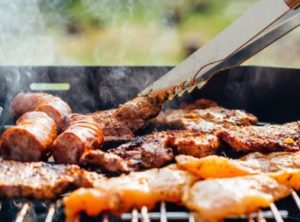 It’s officially barbecue season! If you plan on hosting events at your home this summer, it’s important to keep food safety in mind. This will help avoid your guests from getting food poisoning and suing you for damages! Here are some grilling food safety tips to keep in mind.
It’s officially barbecue season! If you plan on hosting events at your home this summer, it’s important to keep food safety in mind. This will help avoid your guests from getting food poisoning and suing you for damages! Here are some grilling food safety tips to keep in mind.
Store Meat Properly
From the moment you bring meats home from the market, you should take steps to keep the meat from spoiling. First and foremost, immediately store your meat in the fridge or freezer. This prevents the bacteria growth. Keep in mind that meat should be stored in your fridge for only a couple of days. If kept in your freezer in a proper storage bag/container, it will last anywhere from a month to a year depending on the type of meat. Click here for additional meat storage guidelines.
If you are bringing your meat outside awaiting the grill, consider placing it in a cooler. Never leave meat out for an extended period of time, especially in hot weather. It can easily and quickly spoil.
Safely Cooking Meat
No grill food safety tips would be complete without a discussion on cooking temperatures. Don’t rely on the color of meat to determine whether it’s properly cooked. A meat thermometer is your best bet to confirm the internal cooking temperature, especially when it comes to chicken and pork. Check the guide on safe cooking temperatures for different meats.
Also think about how you are handling meat during cooking. Avoid using the same tongs/utensils for raw and cooked meat. Be sure to also use a different dish for each.
Storing Meat After It’s Cooked
Just as you shouldn’t leave meat out before it’s cooked, it’s not a good idea to leave it out after it’s cooked either. This might be tough when cooking for a large number of guests. Meat should remain hot, at about 140 degrees, if you need to store it. Here are a few storage options that may help:
- Warming Trays with Fuel Cans
- Hot Oven
- Slow Cooker
Why Take These Grill Safety Tips into Account
With so much fun to have this summer, it’s easy to overlook food safety. Serious incidents of food poisoning can result in hospital visits and hefty medical bills. Your guests will likely sue you and your homeowners insurance company. Although homeowners insurance may cover all or part of the damages, you will still incur some costs from deductibles and higher future insurance premiums. If your insurance coverage is not sufficient, you will be personally responsible for any shortage. Lastly, you may also lose some friends in the process. Avoid the headache from all of this by taking extra precautions when grilling food this summer. Have a fun and food safe summer!


